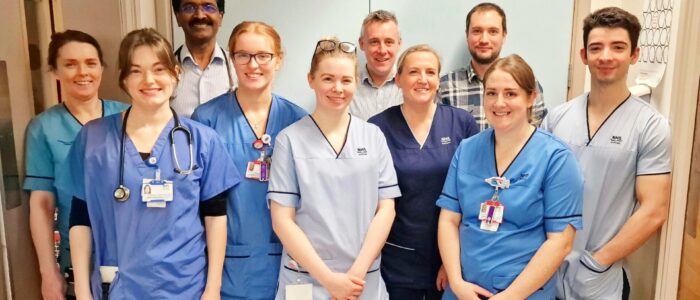New Service Could Significantly Improve Outcomes for Stroke Patients
A new service, which aims to further improve outcomes for certain stroke patients who have experienced a blood clot in their brain, has been introduced in NHS Forth Valley.
The thrombectomy service, which is being delivered in partnership with stroke specialists at Edinburgh Royal Infirmary (ERI), involves using a specially designed clot retrieving device, to help restore blood flow to the brain. The device can remove blood clots that may be too big to be broken down by clot-busting drugs and, in some cases, can also be used in patients who are unable to take these drugs. Prior to the development of the thrombectomy service, clot busting drugs were the only treatment available for patients who had experienced a stroke. However, thrombectomy is a major clinical development which has the potential to save lives and significantly improve outcomes.
Under the new arrangements, patients who have experienced a stroke will now undergo a CT scan to see if there is evidence of a significant blood clot in their head or neck which is blocking blood flow to parts of their brain (also known as an ischaemic stroke). If this is identified, and they are suitable for the procedure, they are then transferred to ERI where an interventional neuroradiologist can carry out the thrombectomy in the hospital’s cath lab using specialist diagnostic equipment.
After treatment, patients are either transferred back to Forth Valley Royal Hospital for ongoing care rehabilitation, if required, or discharged home after a short stay at Edinburgh Royal Infirmary.
It is estimated that around 30 – 40 patients from the Forth Valley area may be suitable to be transferred to ERI each year to undergo the procedure, which is most effective when performed within six hours after stroke symptoms begin. This number is also expected to rise over the coming years.
Because of the highly specialist nature of the procedure, the service operates as a hub and spoke model and Forth Valley Royal Hospital was the first spoke hospital outside of the Lothian area to offer the procedure.
Dr Tom French, Consultant in Stroke Medicine, NHS Forth Valley, said: “This is an important service development which has the potential to significantly reduce the severity of the symptoms and level of disability caused by severe strokes.
“It has taken many months of planning to introduce these new arrangements and I’d like to pay tribute to stroke and interventional radiology colleagues in Edinburgh, staff from the Scottish Ambulance Service, who play a vital role in identifying patients for treatment, our local radiology teams, and our GP colleagues across Forth Valley who provide ongoing care and support for patients after they have been discharged from hospital.”





